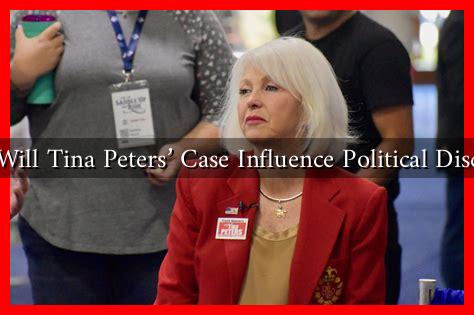-
Table of Contents
How Will Tina Peters’ Case Influence Political Discourse
The case of Tina Peters, the former Mesa County Clerk and Recorder in Colorado, has emerged as a significant focal point in the ongoing debate surrounding election integrity and political accountability. Peters gained national attention after she was accused of tampering with voting machines and leaking sensitive election data. As her case unfolds, it raises critical questions about the implications for political discourse in the United States. This article explores how Peters’ situation may shape discussions around election security, public trust in government, and the broader implications for democracy.
The Background of Tina Peters’ Case
Tina Peters, a Republican, became embroiled in controversy following the 2020 presidential election. Allegations surfaced that she had allowed unauthorized individuals to access voting machines, leading to claims of election fraud.
. In 2021, Peters was indicted on multiple charges, including conspiracy to commit theft and criminal impersonation. Her actions have sparked a heated debate about election integrity, particularly among those who believe that the 2020 election was marred by fraud.
Impact on Election Integrity Discourse
Peters’ case is likely to amplify discussions about election integrity in several ways:
- Heightened Scrutiny of Voting Systems: The allegations against Peters have led to increased scrutiny of voting machines and their security protocols. This could result in more rigorous standards and audits across the country.
- Polarization of Public Opinion: Peters’ supporters view her as a whistleblower fighting against a corrupt system, while her detractors see her actions as undermining democracy. This polarization may deepen divisions within political discourse.
- Legislative Responses: Lawmakers may feel pressured to introduce new legislation aimed at enhancing election security, which could lead to a patchwork of laws varying by state.
Public Trust and Accountability
The fallout from Peters’ case also raises important questions about public trust in government institutions:
- Trust in Election Officials: Peters’ actions may erode public confidence in election officials, particularly among those who already harbor skepticism about the electoral process.
- Calls for Transparency: Citizens may demand greater transparency and accountability from election officials, leading to increased public engagement in the electoral process.
- Impact on Future Candidates: The case may deter potential candidates from running for office due to fears of being scrutinized or accused of misconduct.
Broader Implications for Democracy
The implications of Peters’ case extend beyond election integrity and public trust. It reflects a growing trend in American politics where individual actions can have far-reaching consequences:
- Normalization of Conspiracy Theories: Peters’ case may contribute to the normalization of conspiracy theories surrounding elections, further complicating the political landscape.
- Influence on Political Rhetoric: Politicians may adopt more extreme rhetoric regarding election security, which could lead to increased tensions and conflict.
- Potential for Legal Precedents: The legal outcomes of Peters’ case could set precedents for how similar cases are handled in the future, influencing both legal and political strategies.
Conclusion
Tina Peters’ case is a microcosm of the larger issues facing American democracy today. As her legal battles continue, the discourse surrounding election integrity, public trust, and political accountability will likely intensify. The ramifications of her actions may lead to significant changes in how elections are conducted and perceived in the United States. Ultimately, Peters’ case serves as a reminder of the delicate balance between safeguarding democracy and ensuring accountability within the political system.
For further reading on election integrity and its implications, you can visit Brennan Center for Justice.





